|
|
|
Focus On: Volunteers
July 2024
|
|
|
|
|
|
|
A Massive THANK YOU to all our volunteers!
|
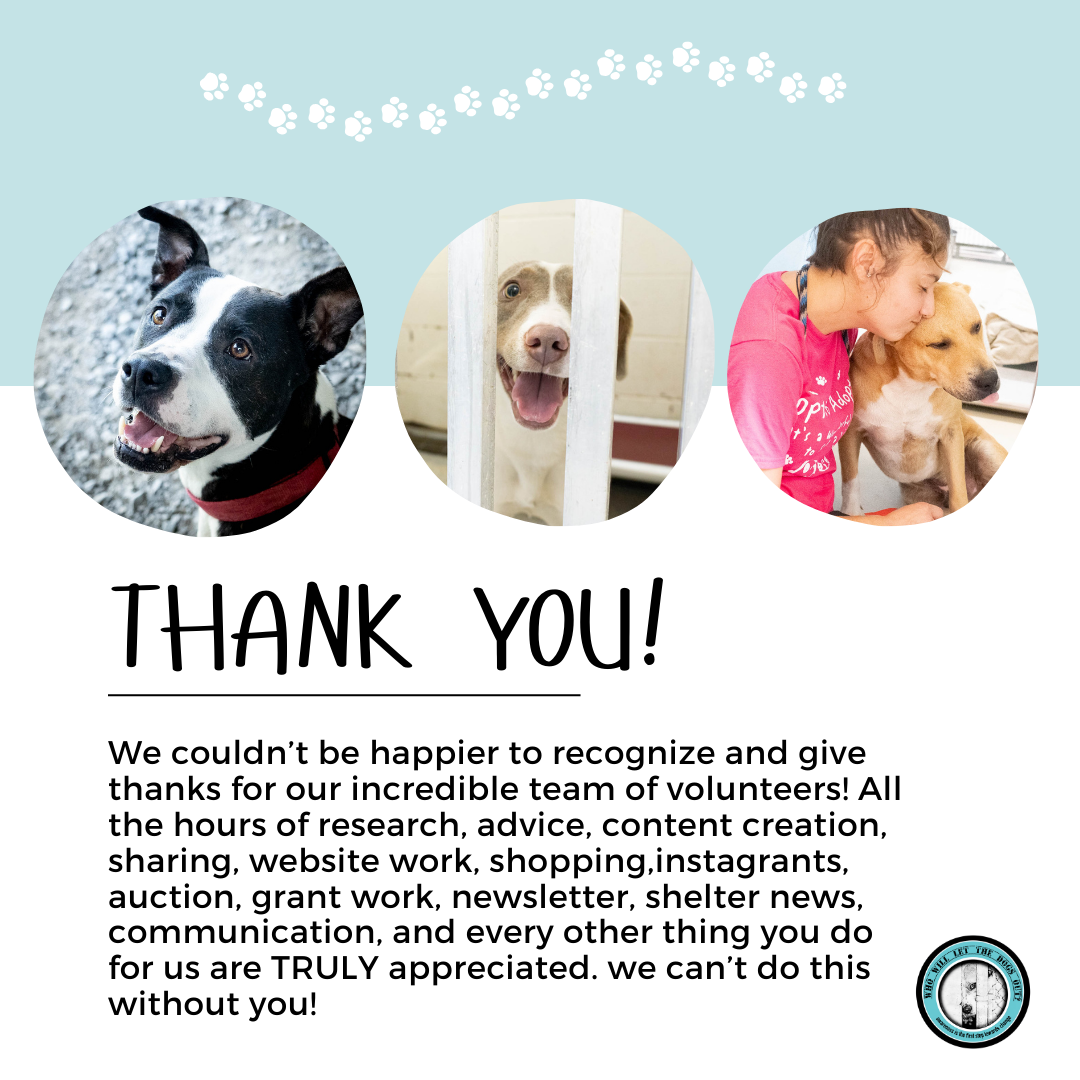
|
Focus On: Volunteers
|
We have over thirty-five volunteers from all over the country who volunteer with WWLDO. Just typing that humbles me. I’m so grateful for the work they do and their belief in our mission, but most especially for the time and effort they so willingly share with us. We couldn’t do what we do without them.
|
|

|
|
Volunteers are critical to the success of any nonprofit organization, but especially shelters and rescues. Honestly, I don’t know a single successful shelter or rescue that does not have volunteers at the core of their work. Here are five reasons why EVERY shelter and rescue needs volunteers.
|
|
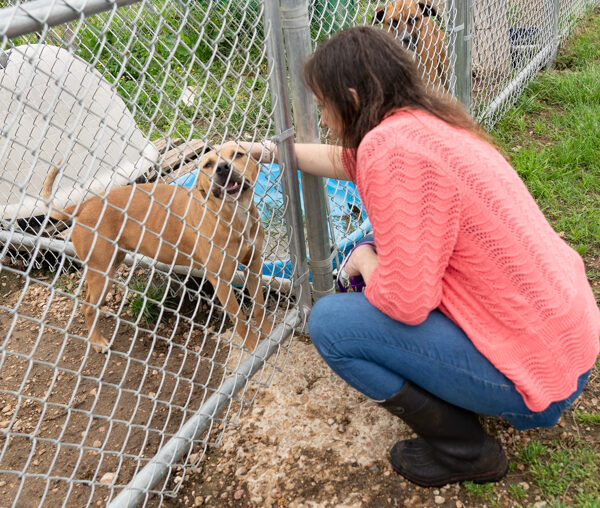
|
|
1 – Volunteers multiply the number of humans your dogs come in contact with daily. And human contact is critical for the well-being of shelter dogs. Studies have proven this over and over. Even if that contact is a person just sitting outside their kennel—it makes a life-saving difference.
|
|
2 – Volunteers are your best marketing tool. Volunteers talk about the shelter to friends and family – raising awareness and marketing dogs more effectively than any Facebook campaign.
|
|
3 – Volunteers become your very best advocates. They are the people most likely to speak up in support when it’s time for your municipality to approve a budget increase or a building proposal. Create a large enough volunteer pool and it’s likely some of them actually know the decision makers in your community.
|
|
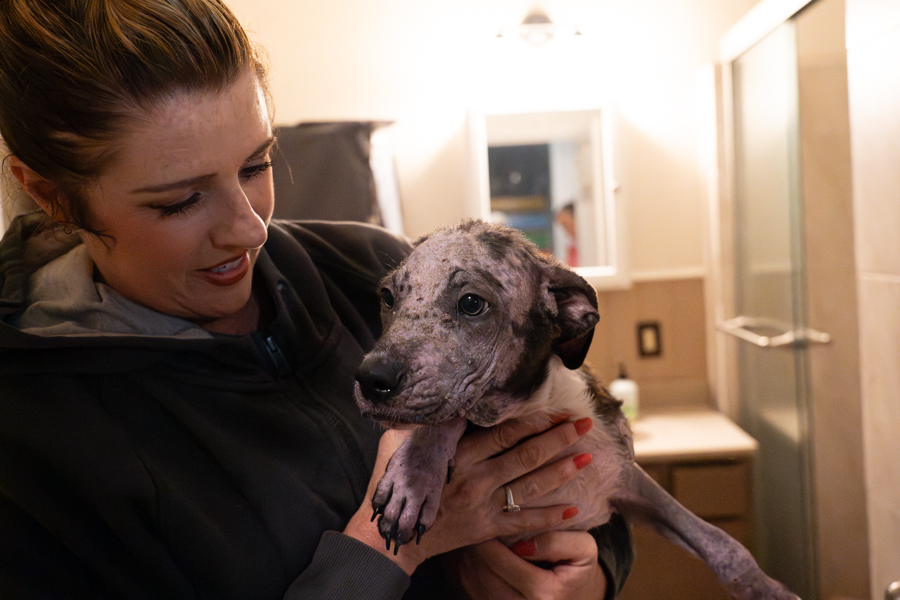
|
|
4 – Volunteers bring talents you need. Photographers, social media whiz kids, grant writers, organizational talents, computer experts, engineers, handyman/woman, gardeners volunteers have skills that can benefit a shelter in a million ways. Have a need? Ask for a volunteer to fill it. Often people are just waiting to be asked.
|
|
5 – Volunteers make for a better shelter. Volunteers bring new ideas and energy to a shelter. So often the very best ideas come from people who see the shelter from a different angle. So be sure to listen to the volunteers you have and ASK for their opinions and ideas. They are a wealth of help just waiting to be tapped.
|
|
|
|
|
Until Each One Has A Home,
Cara Achterberg
|
|
|
|
|
CALL FOR IN-KIND DONATIONS
|

|
Our Annual Fall Auction is slated for
September 27 – October 7, 2024.
As a completely volunteer-run and donation-based organization, we rely on out Annual Auction to provide tangible help to our partner shelters. We use our instagrants exclusively for investments in items with long-term benefits like kuranda beds, providing new, larger kennels, and improvements to the shelter itself, like repouring concrete floors to prevent worms and parvo. This cornerstone of our programing requires in-kind donations from the community in order to fundraise.
|
Would you like to provide a basket for our auction? Contact us.
|
|
Know an organization that would like to support us?
|
|
|
|
|
|
|
|
An Inspiring Story: Bringing Change in Meade County Kentucky
|
|
|
|
We see a lot of hard situations on shelter tours, but sometimes what we see is flat-out inspiring. That was the case with Meade County Animal Shelter, a small municipal shelter in rural Brandenburg, Kentucky. They are proving that with leadership, community engagement, and veterinary access you can turn a kill shelter into one that is saving all the adoptable …
|
|
|
|
|
|
|
|
WWLDO Volunteer Corner
|
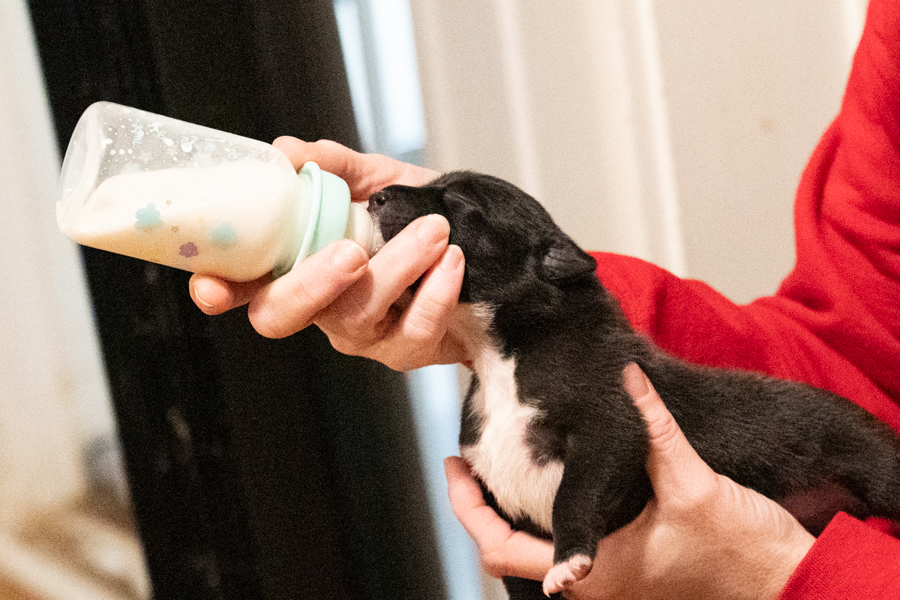
|
Virtual Volunteer Opportunities
|
|
|
Resource Guide Copy Editor
|
|
The WWLDO Resource Guide has grown significantly over the last year and is one of the most visited sections of the website. We are in need of a Copy Editor, who will be responsible for editing and proofreading Resource Guide content. If interested, please reach out to our Volunteer Coordinator Laura May at laura@wwldo.org.
|
|
|
|
Would you like to help raise awareness and resources for homeless dogs and the heroes who champion their cause? As a Shelter Liaison you can make a difference from the comfort of your own home. Shelter Liaisons play a crucial role in virtually supporting our shelter partners. As a Shelter Liaison, you will be monitoring our shelter partners' posts on social media and sharing their news, ideas, and needs.
|
|
|
|
|
|
|
|
From the Resource Guide
|
Recruiting Shelter Volunteers
Cultivating a vibrant volunteer program infuses an animal shelter with good energy, makes the animals happier and more adoptable, and improves the shelter's relationship with the community. At many shelters, volunteers fill crucial roles when there’s a shortage of full-time staff.
|
Following are some tips on how to recruit shelter volunteers:
|
According to Best Friends Animal Society, word-of-mouth is one of the best ways to recruit volunteers. Most people volunteer because they were asked. Here are just a few ways shelters can ask for help:
|
- Invite current volunteers to bring a friend to a special get-together.
- Ask board members to provide a list of potential volunteers.
- Ask your members for help through your newsletter. Include a listing of your volunteer needs and provide a checkbox on the donation-response form for donors to request more information on volunteering.
- In a Maddie’s Fund forum one shelter professional recommended reaching out to former volunteers and having an honest conversation about why they left. This might be enough to motivate them to return but just as important, it might highlight a problem that needs to be addressed to help retain current volunteers.
- A simple poster campaign is an inexpensive, but highly effective way to find new volunteers. Following are some tips when using flyers or posters as part of your recruiting process.
- Your flyer or poster should list attractive, well-defined volunteer positions.
- Keep the text on the flyer to a minimum and include pictures or graphics to grab attention.
- Offer a variety of opportunities, involving different skills and levels of commitment.
- Shelter flyers and posters should be displayed in as many places around the community as possible. Think of places animal lovers frequent and also businesses that get a lot of foot traffic. Some good examples include local vet clinics, pet supply stores, groomers, doggy daycares, health clubs, places of worship, libraries, and grocery store community boards.
- Colorful posters can also be shared on social media.
- Ask current volunteers to help distribute the posters around town.
Other Ways to Recruit Volunteers
|
- Take advantage of free volunteer listings in local newspapers.
- See if your local radio station would air a 30-second public service announcement for seeking shelter volunteers.
- Set up volunteer information tables at local pet supply stores or community events such as fairs, festivals, and weekly farmers markets.
- Focus recruitment on areas where volunteers might be looking for opportunities such as high schools, colleges, houses of worship, and senior centers. Post volunteer opportunities on bulletin boards in these facilities and ask for permission to go and speak about the shelter and the important roles that volunteers play. In addition to visiting the local senior center, contact the director of the AmeriCorps Seniors RSVP (Retired & Senior Volunteer Program). Ask to have the shelter added to the list of volunteer opportunities sent out to members of this program.
- Some businesses have volunteer days when they pay employees to go out and lend a helping hand in the community. Get a list of these companies and then reach out to their Human Resources Department to be added to their nonprofit lists. This is a great way to get larger projects completed at the shelter and some shelters report that two or three people from these groups sign up to become regular volunteers. Additionally, these companies often reach out to the local media for coverage of their employees volunteering in the community, which gets more exposure for the shelter and can lead to more volunteers.
- Reach out to your local Rotary and Lions clubs for help. Both organizations promote service in the local community.
- Online promotion is also effective. For example, using free recruiting sites such as VolunteerMatch.com.
- Speak with the leader of local running, walking, or hiking clubs about their mission and discuss how members might benefit from volunteering at the shelter. For example, walking the dogs. Ask to visit with the group to talk about the shelter and share volunteer opportunities that might be of interest to the members.
- Host quarterly coffee, juice, and donuts meet and greets at the local library or community center. According to contributors to the Maddie’s Fund Forum, people tend to show up when there’s free food offering a great opportunity to share the shelter’s mission, many successes, and volunteer opportunities.
|
|
|
|
|
Tips for Shelter Partners
The Dog Days of Summer Are Upon Us!
|
|
|
Grant Assistance
|
WWLDO offers grant assistance! Please don't hesitate to reach out to WWLDO grants advisor Nicole Sandler (nicolemiasandler@gmail.com), if you’d like to chat about the many grants opportunities listed in the WWLDO Resource Guide or simply how to apply for grants.
|
|

|
Tip of the Month
|
|
Its a hot one! Across the country, we've been seeing record high temperatures. Check out our resource guide's newest section:
|
|
"How to Keep Shelter Dogs Cool When Temperatures Rise."
|
|
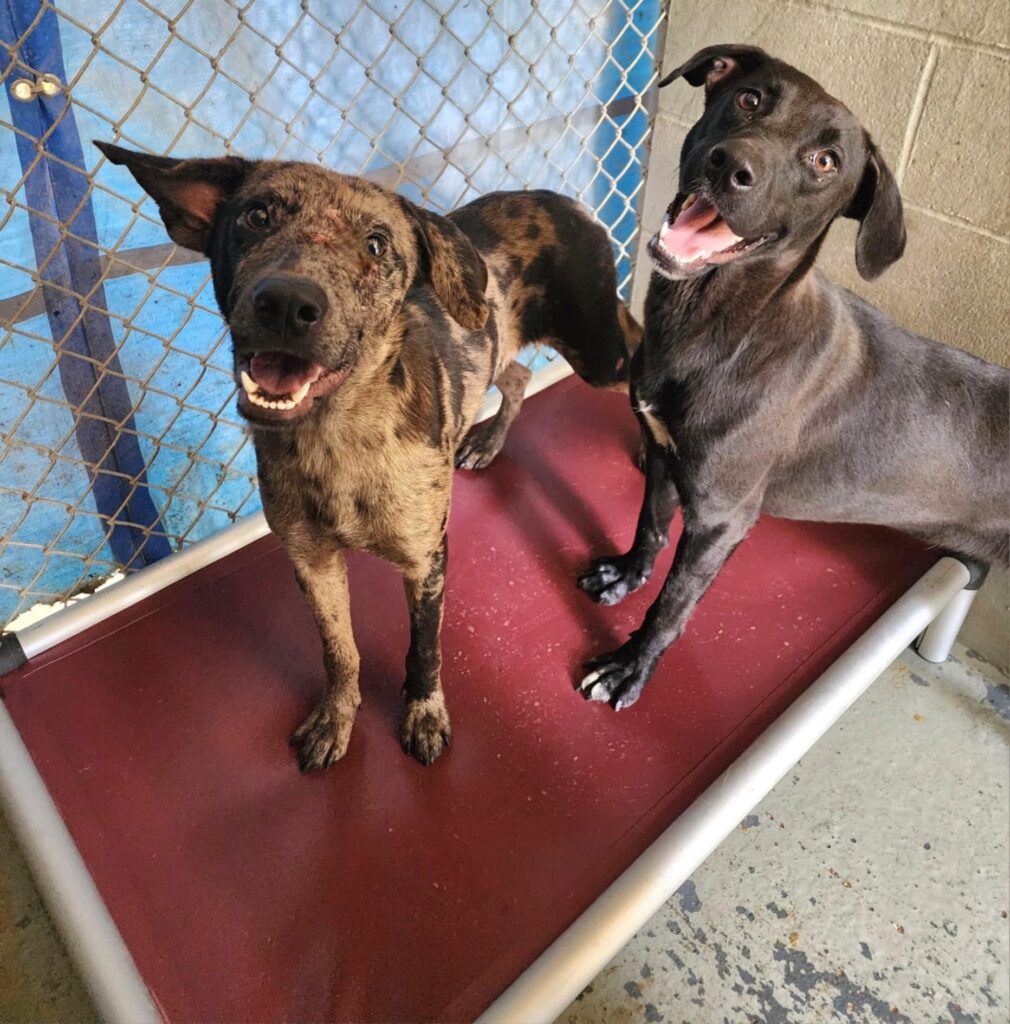
|

|

|
Dog Ice Cream
Ingredients:
2 ripe bananas
1 cup plain Greek yogurt
1/2 cup peanut butter (unsweetened and xylitol-free)
1/4 cup water
Instructions:
In a blender or food processor, combine bananas, Greek yogurt, peanut butter, and water.
Blend until smooth and creamy.
Pour the mixture into ice cube trays or silicone molds.
Freeze for at least 2 hours or until solid.
Pop out the ice cream cubes and serve to your dog as a treat.
Notes:
Ensure the peanut butter is free of xylitol, as it is toxic to dogs.
You can substitute Greek yogurt with a dairy-free yogurt if your dog is lactose intolerant.
Prep Time: 10 mins | Freezing Time: 2 hrs | Total Time: 2 hrs 10 mins | Servings: 12-15 treats
Bonpupatite!
|
|
|
|
|
|
CALL TO ACTION:
Help Us Connect With Animal Rescues!
|
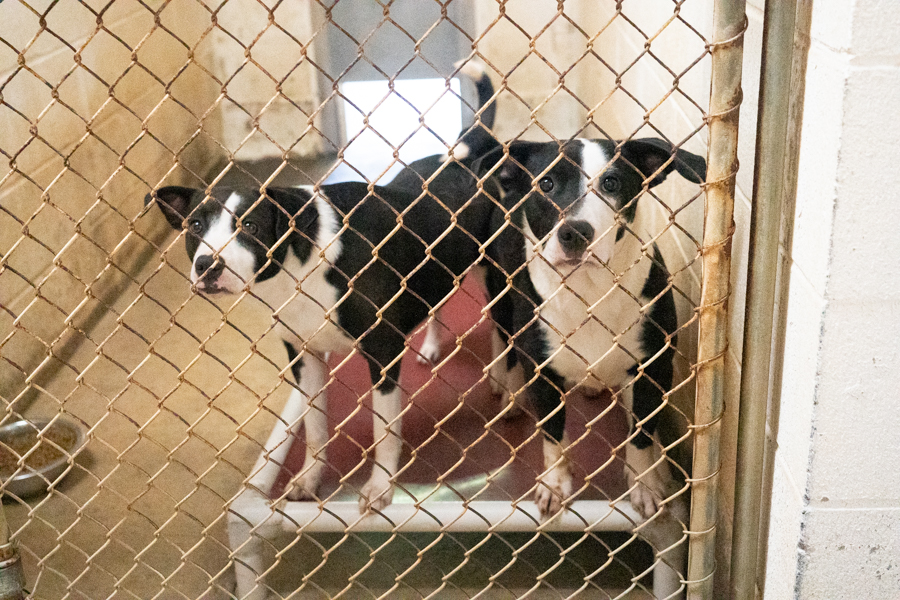
|
|
|
Do you know any Animal Rescue or "Friends Of" organizations? The shelters we work with are frequently searching to connect with Animal Rescues across the country to aid in their mission of getting dogs out of shelters and into their forever homes. We are currently working on a project to expand our network of connections with Animal Rescue organizations, and we need your help!
|
What's the difference between an Animal Shelter and a Rescue? Although in everyday conversation the two are often used interchangeably, they operate differently and often in tandem with one another. FuRR Feline Rescue sums it up well: "Shelters are typically funded at the town, city, or state level. People may refer to them as animal control or the pound. Workers at the shelter may be paid... Most rescue organizations in the United States are non-profit 501(c)(3) and run by private individuals or by a small group. Most rescues do not have over-populated facilities and can care for each animal personally." Frequently, animals in rescues start out in public shelters, and shelters love to connect to rescues in order to get help with connecting to adopters, especially for dogs that may need more care or attention. Learn more here.
|
|
If you have a connection to, or even knowledge of, Animal Rescues in your locality, please get in touch so that we may connect with them. The more we can connect our shelter partners with resources to lighten their load, the more lives we can save!
|
|
|
|
|
|
|
|
|
|
|